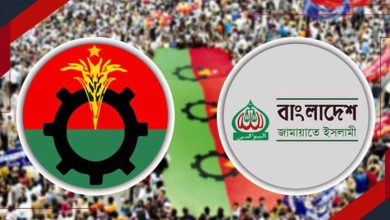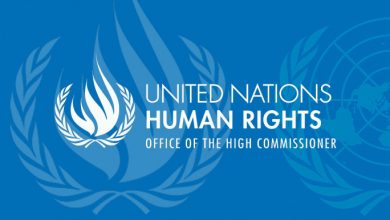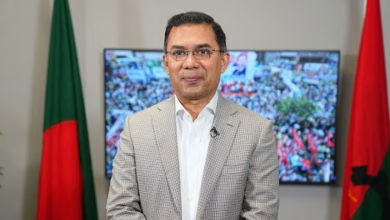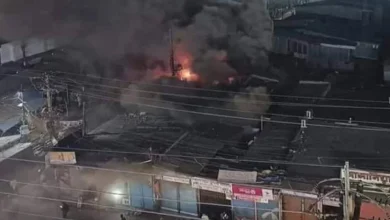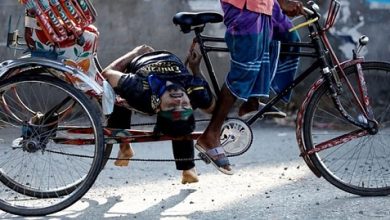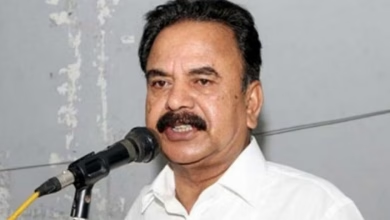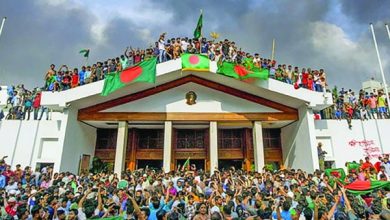US believes Bangladesh ready to enact reforms, stands ready to offer support

In an exclusive interview with The Business Standard, Deputy Undersecretary and Assistant Secretary for International Finance and Development Brent Neiman and Deputy Assistant Administrator of USAID Asia Anjali Kaur sat down to discuss the current situation in Bangladesh and how the two countries can mutually benefit through their robust ties down the road.
The United States believes that Bangladesh is ready to enact reforms, despite those being difficult, and it is ready to stand by and offer any support it can in this regard, Deputy Undersecretary and Assistant Secretary for International Finance and Development Brent Neiman said today (15 September).
In an exclusive interview with The Business Standard in the EMK Centre in the capital, he underscored Bangladesh and US ties with an eye towards ensuring the bond between the two countries can grow and deepen further.
“And toward that end, we’ve been working together. Today, we met with counterparts, Bangladeshi authorities, to talk about some of the challenges that Bangladesh is facing, things like the need to improve the business environment and root out corruption… appropriately setting monetary and fiscal policies,” he said.
He also said through working together to make the necessary reforms and enhance the environment, economic ties between the two countries can only grow stronger.
Speaking to TBS, Anjali Kaur, deputy assistant administrator of USAID Asia, highlighted how historically critical the current juncture has been for Bangladesh.
Highlighting USAID’s work in Bangladesh for the past five decades, Kaur pointed out the current unprecedented flooding plaguing the country.
“Something new we’ve been able to do is provide even additional support for flooding to areas that we’ve never done before…But now we’re doing in Chattogram, into new areas, where we’ve seen unprecedented flooding. This is the emergency response we provide,” she said.
Kaur also said they were now thinking about innovations to climate resilience, pointing out the recent agreement signed with Bangladesh worth over $200 million.
“This comes at a really critical time for us because we’ve been having these conversations with the interim government, with Chief Adviser Professor Yunus and all the other advisers, to really understand how do we take these areas that we’ve been working on and pivot them to the priorities of this government right now.”
A number of other important issues were also touched upon during the discussion. Below is the full Q&A from the session:
Question: What opportunities do you see for enhancing economic collaboration between Bangladesh and the United States, especially in sectors like trade, investment, and technology?
Brent Neiman: Thank you. Well, you know, as you know, the investment and trade ties between the United States and Bangladesh are very strong and have been for a long time.
The United States is the largest importer of Bangladesh exports and actually the largest provider of inward foreign direct investment into Bangladesh.
So the relationship is strong. And of course, those figures grew on the backs of, you know, significant growth over several decades in Bangladesh.
I think the key to making sure that those ties can in fact grow and deepen is to make sure that Bangladesh can continue along its trajectory of sustained growth. And toward that end, we’ve been working together. Today, we met with counterparts, Bangladeshi authorities, to talk about some of the challenges that Bangladesh is facing, things like the need to improve the business environment and root out corruption, things like appropriate, appropriately setting monetary and fiscal policies. And we look forward to working together with Bangladesh and offering support in any way we can toward making the reforms and enhancing the environment, which I think will lead to even stronger economic ties between the U.S. and Bangladesh. Secretary Yellen, President Biden, Vice President Harris And throughout our administration, we all know that some of these reforms will be very difficult to enact.
But we think that Bangladesh is ready to do it, that they will bring tremendous benefit to Bangladesh’s. And we look forward to supporting and helping in any way we can.
Question: What are the primary areas where the United States sees potential for enhanced cooperation with Bangladesh, particularly in terms of economic development, governance reforms, and capacity-building initiatives?
Anjali Kaur: We are here at a historically critical juncture for Bangladesh. And so for this delegation to be here today is very important for all of us.
USAID has worked with Bangladesh for over five decades now, and in this relationship we have worked across sectors in this entire country and we have focused on lifting up the people of Bangladesh in partnership. That has been our model to do everything in partnership with the government and with the people of Bangladesh.
We’ve worked across a number of different areas, so it has been economic growth and stability. We focused on environmental conservation, clean energy, and climate resilience.
We focused on education, enhancing education. Overall, we focused on health and health service delivery and strengthening health systems.
We’ve also focused on being able to provide humanitarian assistance in disaster risk support.
And we’ve also looked at how we make sure democracy, rights and governance are adhered to. As you remarked on most recently, I think, you know, since we’ve gotten to Bangladesh, it has been raining non stop. And what it’s shown us is that there’s been flooding, unprecedented flooding in the country. And so something new we’ve been able to do is provide even additional support for flooding to areas that we’ve never done before. I’ve always seen flooding support just in that.
But now we’re going to Chattogram into new areas where we’ve seen unprecedented flooding and this emergency response that we provide. It’s really about search and rescue, providing multipurpose financial assistance, being able to provide food, clean water to those that are the most vulnerable. But then alongside that, we’re doing longer term development assistance. And this really looks like making sure you don’t have waterborne diseases in these places that are getting flooded. But also thinking about what are the innovations to climate resilience that we can take care of.
So this enhances our linkages across the programs, making sure that we’ve got nutrition along with the health support, making sure that we’re thinking about the future in terms of climate smart agriculture, alongside with the additional support that we’ve been providing across all sectors. And so I think you’ve seen we just signed a new agreement of over $200 million, and this comes at a really critical time for us because we’ve been having these conversations with the interim government, with the chief advisor and with all of the other advisors from the Foreign Ministry to Finance to Commerce to really understand how do we take these areas that we’ve been working on and pivot them to the priorities of this government right now.
Question: How can the United States help Bangladesh attract more American investments and explore new export markets to bolster its economy? Are there specific sectors where both countries can collaborate more closely?
Brent: Thank you. I think it’s an important question because Bangladesh actually lags behind peers and neighbors in the region in terms of the importance of foreign investment or the share of foreign investment relative to the size of its economy. So it’s an area where I think Bangladesh would benefit from drawing in more foreign investment.
And it’s more than just the availability of foreign capital. When you have foreign firms investing in Bangladesh in the country, there’s scope, for example, for its business practices, those firms to spill over and enact positive change to the business environment. Foreign companies, maybe no different ways to, you know, train their workforce or handle their procurement. And to the extent Bangladesh brings in firms like American firms that have very high standards and values in those ways, it can produce an additional positive spillover.
It also can help Bangladesh diversify its export and production bundles by bringing in new intermediate inputs, bringing in new expertise, new ways of thinking of things which can lead to innovation and growth ultimately. So I do think this is important to try to think of ways that Bangladesh could increase the amount of investment, particularly from American firms that it hosts.
We actually met on this trip US firms and tried to better understand what limitations, if any, are keeping them from investing even more than they already have been doing in Bangladesh. And there were a number of very specific suggestions which we hope to work together with the Bangladeshi authorities and try to make progress on some of them.
For instance, you know, might require studies where the Bangladeshi authorities could work together with either our U.S. aid or at Treasury.
We have something called an Office of Technical Assistance that can provide advice on how to, for example, administer certain policies, which might make it easier for foreign investors to come into the market. Other issues they described were, for instance, the availability of foreign exchange that they can very easily conduct imports, things like that which certainly we’d like to support Bangladesh in making progress on as it develops its reform agenda.
Question: As Bangladesh works to address its economic challenges, particularly in areas like asset recovery and financial governance, how can the U.S. provide technical assistance or partnerships to support these efforts?
Brent: Yeah, I think it’s important that Bangladesh knows that it has a variety of potential suppliers of the kind of expertise that could help Bangladesh develop capacity in these areas and certainly the United States can be and wants to be a part of that.
I work at the Treasury Department and again, our Office of Technical Assistance, you know, routinely offers program and programs and support, for instance, to strengthen, you know, country’s financial intelligence units or improve their revenue management systems or help them think about handling of potentially bad assets or non-performing loans or difficulties in the banking sector.
And these are all areas that we certainly look forward to helping facilitate communication between the appropriate Bangladeshi authorities and our OTA Office of Technical Assistance Experts and hopefully can find a way to work together moving forward.
Question: The interim government has initiated a comprehensive reform agenda. In which specific development areas—such as health, education, or agriculture—can the United States offer strategic support to advance these reforms?
Anjali: I think that we continue to provide support in all three. I would highlight, as my colleague Brent had said, economic stability and growth is one of our biggest priorities right now at this point in Bangladesh.
And I think what we’ll continue to do as a whole of the US government is be able to support as it figures out the path forward and be able to provide technical assistance, be able to provide technical advice. The work that we’ve done to support other countries that have been on a similar path, we will take those lessons learned and be able to help Bangladesh in the same way.
One of the things that we’ve heard very clearly from this government is that it wants to be known as an anti-corruption government. And so for us that is a great signal from the interim government. And so we will do our best to be able to support them in these efforts to be able to support processes, to create more transparency, to be able to help them digitize efforts so that it can be more thought through so everyone can know across the country what is happening. And we feel that the Bangladeshi people, what they have told the government is that they want to be involved, they want to know what’s happening and they want to own the reforms and themselves. And so our efforts are to be able to strengthen governance. So that everyone feels that they’ve got the civic participation and the understanding to be engaged.
And one of our key points in our programing is youth empowerment and engagement. And we all recognize how critical that is. And so part of that means is making sure that the youth are skilled so that they have the opportunities for jobs and livelihoods that allow them to live a prosperous life. But it’s also thinking about inclusive prosperity for the whole of Bangladesh and what that looks like for the growth and development of this country. And so that’s what we’re truly focused on in partnership with the interim government and with the people of Bangladesh.
Question: Given Bangladesh’s current liquidity crisis, what kind of financial or technical support can the United States provide to help stabilize the country’s economy and encourage sustainable growth?
Brent: Well, on these issues, my view is that the role of Bangladesh’s IMF program is really essential and so we are in our discussions with the authorities today, certainly encouraging a robust engagement with the IMF and a strong commitment to IMF program backed reforms.
That, to me, seems to be the first and perhaps most important, immediate step in handling many aspects of the problems that you just described. There’s also support that we expect from other international financial institutions. The World Bank, for example, and the Asian Development Bank have each committed on the order of $5 billion per year to Bangladesh since 2020 and will also be very important partners.
So complementing the efforts of these international financial institutions and advice and textbook technical expertise and support from agencies like USAID or Treasuries, technical assistance, where we’re hoping that Bangladesh will be able and we expect Bangladesh to be able to take some steps that will bring about improvements in the areas and against the challenges that you just described.
Question: How can the United States assist Bangladesh in resolving the Rohingya crisis, both through humanitarian aid and by engaging in diplomatic efforts to find a sustainable solution?
Anjali: Right. First, I want to thank the people of Bangladesh and the government for being so generous and hosting the Rohingya for seven years. I think it is such an act of goodwill and generosity that the whole world recognises and we are doing our part to support Bangladesh in its hosting by making sure that we can support with health services, that we can support with housing, and we can support with nutrition. I’m really happy to say that just over the past few months we’ve been finally able to increase the ration amount for the Rohingya in the camps to $12.50. That is the full ration amount per month that then allows them to have a nutritious diet. But I think there’s a few things that we could be doing that would further the Rohingya better this situation for the Rohingya specifically in the camps.
And the first is livelihoods. We know that if the Rohingya had livelihood opportunities within the camps, it would allow them to live a more sustainable and dignified life, which is something we all want. And if they had durable housing, currently the materials that are used for their housing situation, it has to be replaced every time there’s a storm or massive rain.
And so if we had durable materials for this temporary housing, it would truly allow them to be able to live in the housing for a long period of time and not have to rebuild every single year. And so these are some of the things we’re looking forward to. And I know that all of us here want the Rohingya to return back to Burma, but only when it is safe and it’s conducive.
It’s an environment that allows them to be secure, to return back. We are hopeful that they will go back and that repatriation will happen here in Bangladesh, but we want to see that issue.
Question: There is growing concern in Bangladesh about money laundering and illicit financial flows. How can the United States assist Bangladesh in combating corruption, recovering illicit funds, and ensuring more robust financial governance to prevent future occurrences? Are there any specific laws or mechanisms the US is considering?
Brent: I should start by noting it seems very natural after the past two months for it to be important to Bangladesh to think through issues related to money laundering or illicit finance.
In some of our conversations since today, I mentioned the possibility of building into Bangladesh’s IMF program a governance diagnostic, which is a tool that the IMF offers to try to understand macroeconomic relevant aspects of some of the issues You described corruption and problems structurally that could lead to more illicit finance. And so if Bangladesh chooses to include that element in their IMF program, that would be one way for Bangladesh to get assistance that will hopefully improve and strengthen their system against corruption, against money laundering, against illicit finance.
Question: What new initiatives or partnerships can be expected between Bangladesh and the United States in sectors like climate resilience, renewable energy, and sustainable development, considering both countries’ commitments to addressing climate change?
Anjali: As I said before, yeah, we’re all witnessing climate change every single day, especially here in Dhaka. We’re seeing it live. One of the things we’re doing that I’m really excited about is our climate smart agriculture. And so as we’re noticing in a lot of the farming areas, the farmers are becoming even more and more vulnerable. And so what we’re thinking about is thinking about innovations in seeds. And so how can seeds be more adaptable? How can they respond to salinity in water? How can we think about the different tools and technologies that farmers have that regardless of what’s happening in the environment, they can adapt and respond and still consider how to make a livelihood and produce, you know, goods.
So that’s something that we’re really excited about. We’re also thinking about the need for embankments and how do we support the government that is really thinking about the coastal lines being depleted. And that’s an area that we’ve worked on in the past that we’re going to continue doing in the future. And I think overall, as we think about sustainable development goals, it’s really about how do we localize our solutions, how do we make sure that the people of Bangladesh are really driving the solutions for each of the problem sets that we are facing. So it’s owned by them and there’s a long term response that is owned by the people of Bangladesh. That’s really the way forward, we believe, with all of our collaboration and partnership with the government and with the people here. And it will make the efforts for the Bangladeshi people, for the people of Bangladesh.

